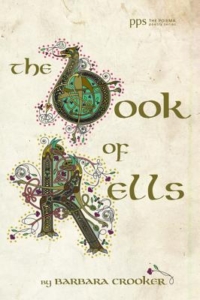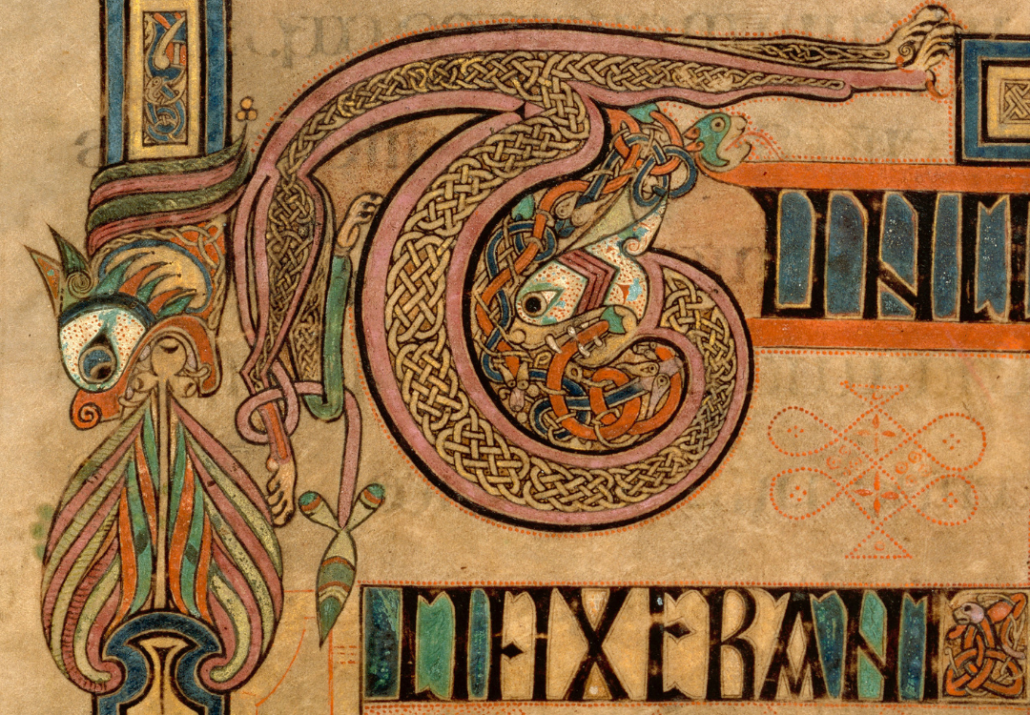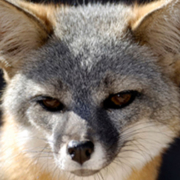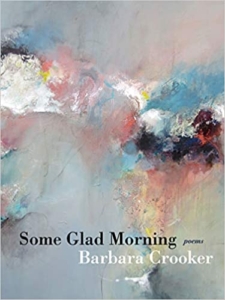Barbara Crooker, The Book of Kells
THE BOOK OF KELLS, Barbara Crooker. The Poiema Poetry Series, Cascade Books, An Imprint of Wipf and Stock Publishers, 199 W. 8th Ave., Suite 3, Eugene, OR 97401, 2019, 88 pages, $12.00 paper, www.wipfandstock.com.
I’ve been saving this book for Easter Sunday. Barbara Crooker wrote these poems, her eighth full-length collection, in Ireland, while on a writing fellowship at the Tyrone Guthrie Centre, Co. Monaghan, Ireland. Her meditations on the Book of Kells, and other aspects of her sojourn, made me want to meditate on her poems. Like this one (note: the r and v refer to recto and verso, right and left, pages of the manuscript):
Interlinear
Let’s praise the agile little animals
that flit here and there in the Vulgate text,
who can wedge in small spaces: the moth
in initial P, antenna flickering outside the line.
Or the monk on his horse, trotting right off the page.
Look, there’s an otter, his mouth full of fish, and here,
a blue cat sits watchfully by. A gorgeous green lizard
slithers in the text, 72r, while a wolf pads his way
through 76v. It’s a whole barnyard: chickens and mice,
hounds and hares, snakes, eagles, and stags. Animals
as decoration. Animals as punctuation. Things seen
and unseen. So let us praise all of God’s creatures,
including the small and the inconsequential, all of us,
interlinear, part of the larger design.—Barbara Crooker
This is a physically beautiful book, bought (again) on impulse, just because it was so lovely. But inside the covers, too, such  beauty! “Somehow Barbara Crooker has fastened it all to the page here: the sweet green world of Ireland, with its glorious book of Kells, its age-old humor, its inimitable music, its poets with their delicious bendy language, so that you can almost taste those buttery scones and its peat-laced Irish whiskey” (Paul Mariani, back cover).
beauty! “Somehow Barbara Crooker has fastened it all to the page here: the sweet green world of Ireland, with its glorious book of Kells, its age-old humor, its inimitable music, its poets with their delicious bendy language, so that you can almost taste those buttery scones and its peat-laced Irish whiskey” (Paul Mariani, back cover).
I wish I could buy copies for all of my friends. I wish I could write such a book. Part, as I said, meditation, part travelogue. “For the monks, the very shape of the letters / were magical, this graceful insular majuscule” (“The Alphabet”). Then the poems drawing from Yeats and Heaney and other Irish poets. And the poems—more familiar to fans of Crooker—of domestic bliss: “drinking tea in a blue-patterned mug / while rain mutters and spatters / the flagstones” (“Almost”).
You will have to get your own copy, but here’s one more poem. It’s set in October (the month I visited Ireland in 2017), but makes a perfect poem for Easter.
Small Prayer
Ireland, late October, and first frost settles on the lawn.
Yesterday, the gardener on his tractor mowed
in concentric circles, a Celtic knot at the center
of his design. Now in the grooves, ice crystals
set off the pattern, illuminate it as surely
as monks in their cells. Up from the lake,
a fairy mist rises, and whooper swans bugle up
the dawn, which flushes the clouds pink and gold.
On this new day, may I walk out singing, open
to what’s never happened before. Let me be grateful.
Let me pay attention. And then when evening
closes the shutters, may I sail through the night
on the back of a swan.—Barbara Crooker
This past Friday evening I attended a Zoom event with Enlighten Kitsap featuring Holly J. Hughes. It was a great introduction to inspirational poetry—and how we need poetry in hard times. She read a number of poems, including one by Barbara Crooker (and one by me!). I highly recommend it. The video should be posted in few days: http://www.enlightenkitsap.org/?page_id=13
And for today, may you “walk out singing, open / to what’s never happened before.”

https://www.tcd.ie/visitors/stunning-easter-symbolism-in-the-book-of-kells/



 for book structure. Even though my ms. Is almost there, I’m still reading other poets’ books, and this week I am reading two books by Barbara Crooker.
for book structure. Even though my ms. Is almost there, I’m still reading other poets’ books, and this week I am reading two books by Barbara Crooker. This link will take you to her poem of the week, “Covid” (which you must read), but from there you can navigate to her homepage:
This link will take you to her poem of the week, “Covid” (which you must read), but from there you can navigate to her homepage: